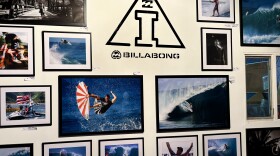RJ De Rama vividly remembers the moment when one of his paddlers crossed the finish line at the Queen Liliʻuokalani Canoe Race in Kona earlier this month. He said everyone was cheering and celebrating them.
De Rama’s California-based team, Makapo Aquatics, is mostly made up of paddlers who are blind. They developed a remote-controlled steering system for their solo paddlers, and they used it for the first time in Hawaiʻi at the race. Many of their members also have Hawaiʻi ties.
“It takes a village to make it happen,” he said. “To have everyone cheering and encouraging (our paddler) just tied it all together.”
He is part of a growing movement to expand opportunities for people who are blind or with low vision to participate in outrigger canoe paddling and other ocean sports.
De Rama, who is legally blind, said they find more communities and programs that include people who are blind or with low vision as they travel to different races.
They have competed in the Queen Liliʻuokalani race several times before, including in 2006, when they became the first team of paddlers who are blind to cross the finish line, he said.
“I think the inclusivity of paddling is a good mirror for how we should approach everything else,” said De Rama, Makapo’s executive director. “Not only do our paddlers with disabilities get something out of it, I think our helpers and our staff and our coaches and the rest of our ʻohana who don’t have these challenges get a little bit of an insight into what life is like with the challenge. And so that opens up new perspectives.”

In Hawaiʻi, the nonprofit AccesSurf offers canoe paddling and other ocean sports for people with disabilities.
Ann Yoshida is AccesSurf’s training and innovation specialist. She was paralyzed from the chest down after a car crash in 2000. She's worked with the nonprofit since its inception, helping others in similar situations.
Yoshida trains with a group of paddlers every Wednesday morning. She started paddling a few years after the car crash and has worked with a handful of paddlers who are blind or with low vision.
“Working with the AccesSurfers, as we call them, it’s almost full circle,” she said. “I was able to feel the empowerment that happens when you get back into a place that you're comfortable with and like you're going back home. And gaining that identity back when I help other people, I get to share and see the beauty that comes from people being empowered in the water.”
One of those AccesSurfers is Eliana Fong. The 9-year-old is blind and has participated in the nonprofit’s surfing, canoe paddling, kayaking and swimming programs since she was 3. She said she hopes to paddle more when she gets older.
“No matter what disabilities you have… it just gives you a sense of freedom,” she said. “And it’s really fun out there.”
Marri Murdoch met Fong through AccesSurf. Murdoch had a stroke five years ago and has vision loss.
She is starting a nonprofit, Travel Visions Aloha, for people who are blind or with low vision in the islands. She said she wants to introduce them to AccesSurf, as well as other fun activities.
“So I want to create that sense of community. There’s just something that clicks when you meet another person that’s struggling with the same sort of issues that you are,” Murdoch said. “And all of a sudden, you don’t really feel scared and alone anymore. And it builds a foundation of friendship and understanding and connection.”






